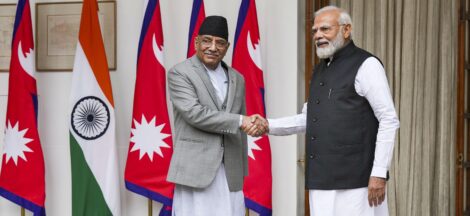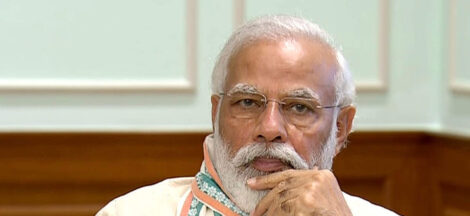By B. Sivaraman
Under the BJP rule, labour issues are also increasingly becoming human rights issues. Is it conceivable that the Indian state in the 21st century could go back exactly a hundred years to usher an industrial relations scenario based on the principles of British Common Law of the colonial times? That appears to be case with the way the BJP government in Maharashtra is going about.
Under the notorious colonial Common Law, labour organising itself attracted the law of torts and courts could issue injunctions against any strike. Workers were made to pay compensation for causing “loss” to the employers if they went on any industrial action. Above all, organising a union itself was considered a conspiracy.
The colonial government considered the first ever formation of union in 1921 in Buckingham & Carnatic Mills under BP Wadia and Kalyanasundaram a conspiracy and ordered firing on the agitating workers. Thanks to the nationwide outcry, these three obnoxious practices were supposed to have been ended by the enactment of the Trade Union Act 1926. But the same legacy surfaces time and again, especially under the BJP governments.
In the last one year alone, workers defied five instances of governments invoking ESMA and four cases of threats to invoke ESMA and went on strikes despite court injunctions.
The Mumbai High Court fining 31 Bajaj Auto workers of Pune Rs. 1 lakh each in 1993 for their struggle was no exception. Workers of many automobile units in Gurgaon-Manesar were made to pay penalties for going on a strike in solidarity with Maruti workers. The latest in the list is the UK auto component MNC GKN Driveline in Oragadam, Chennai, which fined workers for their union activities.
Thirteen workers of Maruti Suzuki, four workers of auto component unit Graziano in Greater Noida and two workers of Pricol, Coimbatore, are serving life sentence for “conspiracy” for plant violence in which CEOs or personnel managers were killed. The labour jurisprudence in India was unable to address the simple issue as to what working conditions turned the innocent workers who join industries for their livelihood into killers under extreme provocations. But use of bouncers to suppress union organisers and agitating workers is a common practice in most of the automobile multinationals, including recently in Yamaha Motors in Oragadam, Chennai.
The latest in this list is the case of eight workers of Reliance Energy, who have been in jail, booked under UAPA allegedly for links with the Maoists. The contract workers of Reliance Energy—formerly known as Bombay Suburban Electric Supply and later renamed as Reliance Infra — in Mumbai, whose services were not regularised even after working for 10 to 15 years, formed a union in 2005 to fight for wage parity as they were being paid only 40% of the wages paid to the regular workers despite doing the same work. Incidentally, Reliance Infra, belonging to the Reliance Group of Anil Ambani, is also a major shareholder of Reliance Naval and Engineering Limited, formerly known as Reliance Defence, which is servicing the Seventh Fleet of US Navy. Interestingly, Dassault Reliance Aerospace Limited of the Reliance Group is now in the eye of a political storm for the controversial Rs. 58,000 crore Rafale deal for which Prime Minister Modi himself has come under attack by the opposition for a major scam. Additionally, Reliance Infra sold its Mumbai power business to Adani Transmission belonging to the Adanis, considered personally very chummy with Modi. An agitation against Anil Ambani, which is being continued against the new owners Adanis, is nothing short of a lèse-majesté for the BJP government in Maharashtra. The Mumbai Anti-Terrorist Squad arrested 8 workers in January 2018 for alleged links with the Maoists and solidarity with the Bhima-Koregaon dalit resistance. They have never faced any criminal cases in the past. Just because advocate Susan Abraham dared to organise these contract workers to fight for their rights against Anil Ambani’s Reliance Infra, her house was raided and her partner was booked under UAPA.
The BJP government also arrested five renowned activists in August 2018 branding them as “Urban Naxals” and they are still in jail. One of them is labour leader Sudha Bharadwaj. Consider her illustrious background. While doing her post-graduation at Kanpur IIT, she was invited by Shankar Guha Niyogi to visit Dalli Rajhara, where his organisation Chhattisgarh Mukti Morcha (CMM) was organising workers, and soon she studied law and started involving herself fulltime in the labour organising.
Regarding her full-time plunge into labour activism, Sudha Bharadwaj said in an interview: “In the absence of a proliferating NGO culture at that time, people like me had only two options. Either build a career or join the movement. In that sense, the option of maintaining your lifestyle and doing progressive work did not exist at that time. In some ways it was good because we chose the other path”.
Regarding her arrest by Pune Police, Goldy George, a fellow PUCL leader and leader of Dalit Mukti Morcha, and a labour leader organising workers of bauxite mines in Chhattisgarh, says: “The NDA government is trampling upon the entire gamut of rights and not only human rights as understood in the conventional manner. Labour rights, women’s rights and Adivasi rights all are turning into human rights issues because of repression”. “Chhattisgarh is a police state, where the law of jungle prevails and not the rule of law under Indian Constitution. Merely forming unions and asking for a modest wage rise invites severe state repression. Sudha defied such repression. Maharashtra BJP government is coming to the aid of Chhattisgarh BJP government by arresting her after dubbing her a Maoist sympathiser”, Goldy adds.
Despite the Supreme Court upholding on 1 June 2015 the Kerala HC’s ruling that being a Maoist itself was not a crime unless she/he engages in specific criminal activities attracting IPC sections, Sudha and other civil rights leaders are still in jail.
About 40 civil society organsiations rallied in Mumbai under the banner of ‘Mumbai Rises to Save Democracy’ and the same day numerous trade unions came together in Bhilai to protest the hauling up of labour leaders and civil rights leaders in a concerted rightwing offensive. (IPA Service)
The post State Repression Of Labour Activists On The Rise appeared first on Newspack by India Press Agency.


